外研版高中英语必修一Module 3 My first ride on a train说课优质课件 (共14张PPT)
外研版高中英语必修一Module3 My First Ride on a Train知识点精讲及练习(含答案)

外研版高中英语必修一Module3 My First Ride on a Train知识点精讲及练习【重点单词短语】match + A + to/with + B 把…和…搭配起来/调和起来e.g. match practice to theory 理论与实践相结合match one’s actions to one’s words【归纳拓展】match+ n. + in/ for + n. 在…与…匹敌,成为…的对手e.g. No one can match her in knowledge of classical music.match+ n. + against/ with+ n. 使…(和…)交手/比赛e.g. He matched his shooting skill against the expert’s.match+ n. 或 match + adv. (和…)调和、适合、与…相配e.g. Her clothes don’t match her age.Her fingerprints ________ (match) those _________ (find) at the scene of the crime.As a couple they are not very well _________ (match).辨析 match / suit/ fitMatch多指大小、色调、形状、性质等方面的搭配;suit多指合乎需要、口味、性格、条件、地位等;fit 多指尺寸、形状合适,引申为“吻合”“协调”。
That doesn’t match your temperament.No dish suits all tastes.My new evening dress fits me quite well.2. distance n.距离,远方,远处The faces of four famous American presidents on Mount Rushmore(拉什莫尔山)can be seen from a ____ of 60 miles.A. lengthB. distanceC. wayD. space【归纳拓展】in the distance 在远处;在远方at a distance 在稍远处keep one’s distance from 与…保持一定距离keep sb. at a distance 与…保持距离;不予某人接近distant adj. 远的;疏远的;稀疏的;冷淡的be distant towards sb. 对...冷淡be distant from 离… 远3.means n.方式,手段(单复数同形)e.g.There is no doubt that radio and television are important means of communication.There is no means of finding out what happened.【归纳拓展】1. by means of sth. 用…的办法e.g. The government helped the victims of the earthquake by every means.He climbed up the tree by means of a ladder.2.by no means 绝不,一点也不(置于句首时须倒装)e.g.By no means is this fight the end of out friendship.【及时训练】1.Every possible means ______ been tried, and we find only ______ this means can we do it we.A. have; inB. have; byC. has; inD. has; by2.For him ______ stage is just ______ means of making a living.A. a aB. the aC. the; theD. a; the4. refer to 提到,涉及;说起;参考,查阅;指的是 (referred, referred, referring)e.g We agreed never to refer to the matter again.我们一致同意再也不提这件事。
外研版高中英语必修1Module 3My First Ride on a Train
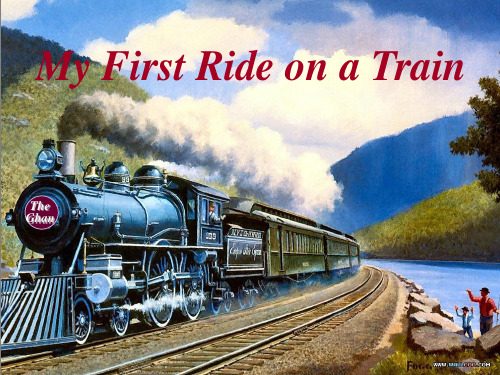
They g_o_t_o_n___in Sydney where andg_o_t__of_f_ in Alice Springs, which
is_in__th_e_m__id_d_l_e of Australia
Recently, she had her _fi_rs_t ride on a how _lo_n_g_-_d_is_ta_n_c_e train,the famous Ghan
train.
Read para.2 and 3 and finish the map
The map of the travel
Sydney
great meals 1.
For the first few hundred After that,it was
c_o_o_k_e_d_by experts
kms, the scenery was 2.
_c_o_l_o_r_f_u_l_.
3._d__e_s_e_r_t.The sun 4._s_h_o_n_e_
Alice Springs
During the day ,she 6.l_o_o_k__e_d__o_u_t_o_fthe
window and listened to Chinese 7.c_a_s_s_e_t_e_s
She explains
A. the origin of the Ghan train and the means of transport for traveling a long distance in the past .
B. when and where their travel took place.
Retell the passage again and fill in the gap
外研版高中英语必修1课件-Module3 My First Ride on a Train

Ghan train Ghan is short for Afghanistan.
【读而后思】 What did the writer think of her first trip on the train? She enjoyed the trip very much and thought it great.
Module 3 My First Ride on a Train Introduction & Reading and Vocabulary
Ⅰ. 速记单词 1. 音意记忆。
helicopter
tram camel cassette diamond expert
shoot soil
journey
2. 形意记忆。 (1)distance(n. )距离→_d_is_t_a_n_t(adj. )遥远的 (2)abandoned(adj. )被遗弃的→_a_b_a_n_d_o_n_(vt. )丢弃; 遗弃 (3)desert (n. )沙漠→_d_e_s_e_rt_ (vt. )遗弃, 抛弃→_d_e_s_e_rt_e_d_(adj. )被抛 弃的, 荒废的 (4)_p_r_o_d_u_c_t(n. )产品→produce(vt. )生产→_p_r_o_d_u_c_t_io_n_(n. )生产; 制作 (5)_s_c_e_n_e_r_y (n. )风景; 景色→scene (n. )场景 (6)_t_r_a_in_ (vt. )训练→training (n. )培训
【归纳拓展】 in the distance at a distance at a distance of from a distance keep one’s distance from keep sb. at a distance
高中英语外研版:必修一 module 3 my first ride on a train 含答案
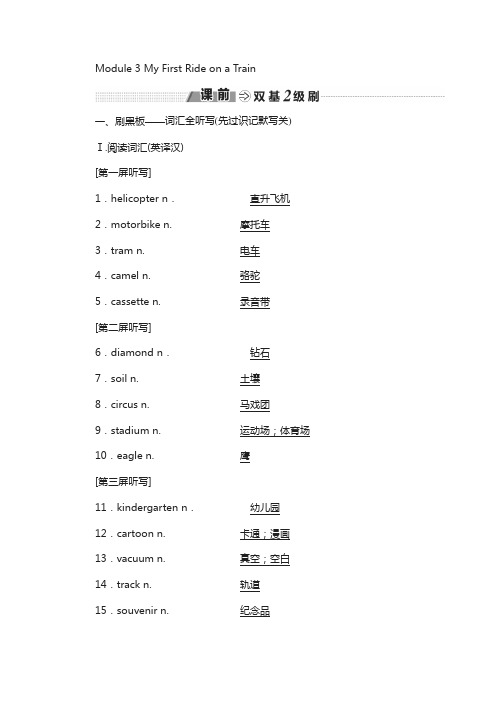
Module 3 My First Ride on a Train一、刷黑板——词汇全听写(先过识记默写关)Ⅰ.阅读词汇(英译汉)[第一屏听写]1.helicopter n.直升飞机2.motorbike n. 摩托车3.tram n. 电车4.camel n. 骆驼5.cassette n. 录音带[第二屏听写]6.diamond n.钻石7.soil n. 土壤8.circus n. 马戏团9.stadium n. 运动场;体育场10.eagle n. 鹰[第三屏听写]11.kindergarten n.幼儿园12.cartoon n. 卡通;漫画13.vacuum n. 真空;空白14.track n. 轨道15.souvenir n. 纪念品Ⅱ.高频词汇(汉译英)[第四屏听写]1.distance n.距离2.abandoned adj. 被遗弃的3.desert n. 沙漠4.expert n. 专家5.product_ n. 产品[第五屏听写]6.scenery_ n.风景;景色7.shoot_ vt. (shot, shot) 射杀8.journey n. 旅程9.train vt. 训练10.seaside n. 海滨[第六屏听写]11.frighten vt. 使吃惊;惊吓12.interview n. 面试;面谈13.interviewer n. (面试时的)主考官;面谈者14.event n. 事件15.exhausted adj. 疲惫不堪的[第七屏听写]16.downtown adj. 商业区的;市中心的17.ceremony_ n. 仪式18.midnight n. 半夜19.apartment n. (美)公寓;单元住宅20.rail n. 铁轨[第八屏听写]21.get_on 上(车、船等) 22.get_off 下(车、船等) 23.get_into 上(车)24.get_out_of 下(车)25.take_off (飞机)起飞[第九屏听写]26.be_short_for 是……的缩写/简称27.not_..._any_more 不再28.out_of_date 过时29.refer_to 指的是二、刷清单——热身自盘点(再过基本应用关)(一)核心单词。
外研版高中英语必修一课时精炼必修1 Module 3My First Ride on a Train
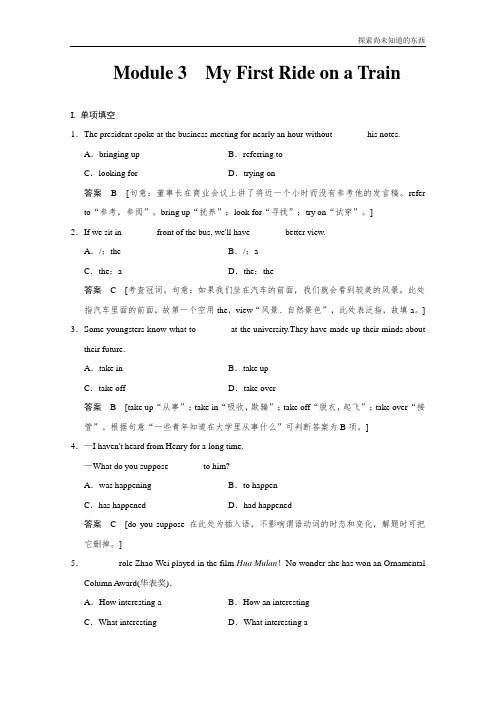
Module 3My First Ride on a TrainI. 单项填空1.The president spoke at the business meeting for nearly an hour without________his notes.A.bringing up B.referring toC.looking for D.trying on答案B[句意:董事长在商业会议上讲了将近一个小时而没有参考他的发言稿。
refer to“参考,参阅”。
bring up“抚养”;look for“寻找”;try on“试穿”。
]2.If we sit in________front of the bus, we'll have________better view.A./;the B./;aC.the;a D.the;the答案C[考查冠词。
句意:如果我们坐在汽车的前面,我们就会看到较美的风景。
此处指汽车里面的前面,故第一个空用the,view“风景、自然景色”,此处表泛指,故填a。
] 3.Some youngsters know what to________at the university.They have made up their minds about their future.A.take in B.take upC.take off D.take over答案B[take up“从事”;take in“吸收,欺骗”;take off“脱衣,起飞”;take over“接管”。
根据句意“一些青年知道在大学里从事什么”可判断答案为B项。
]4.—I haven't heard from Henry for a long time.—What do you suppose________to him?A.was happening B.to happenC.has happened D.had happened答案C[do you suppose 在此处为插入语,不影响谓语动词的时态和变化,解题时可把它删掉。
外研社高中英语必修1三单元

Book 1 Module 3 My First Ride on A TrainI.词汇拓展1._________________ (n.)铁轨2._________________ (n.)仪式3._________________ (adj.)遥远的,冷漠的→_________________ (n.)距离,远方,疏远4._________________ (v.)制造,产生,创造→_______________ (n.)产品→_______________ (n.)生产,成果→_______________ (adj.)多产的,富有成效的5._________________ (vt.)训练→_______________ (n.)训练,培养6._________________ (n.)惊吓,惊骇→________________(v.)使惊吓,吓唬→_______________ (adj.)令人恐惧的→_______________ (adj.)害怕的,受惊的7._________________ (n.)面试,面谈→_________________ (n.)面试官→_________________ (n.)面试者8.exhaust (v.)使筋疲力尽,耗尽,排放废气;(n.)废气,排气管→_________________ (adj.)令人筋疲力尽的→_________________ (adj.)感到筋疲力尽的II.常用短语1.get _______ / _______ 上车/ 下车2.place(s) of interest的意思:____________3.refer ________ 指的是,查阅4.look out of = look ____________ 透过......向外看5.try ___________ sth. 尽力做某事6._________ of date 过时的7.________ a / the speed of 以……的速度8.take ______ 脱下,飞机起飞,事业成功【活学活用】单句语法填空1.Though the travel is ______________ (exhaust), we enjoyed it very much.2.The audience watched four ______________ (train) lions entering the circus ring.3.After years of hard work, Jack’s career started taking __________.4.When you have any questions hard to answer, you may refer __________ your notes.5.With a lot of work ______________ (do) next day, we have to make full use of time.单句语法改错1.I looked out the window and found a man wandering around the building.2.From his frightening look, we know he must have experienced a horrible accident.3.We all believe it is wise to keep him at a distant.4.Women often care too much about their appearance, so more and more beauty care product are made.5.The fast trains with a top speed of 250-350 km/h called CRH, China Railway High-speed.III.词汇详解1. distance n.距离;远方;疏远(1) keep sb. at a distance对某人冷淡,疏远in the distance在远处(2) distant adj.遥远的;远亲的;冷淡的【倔强青铜】①_______ is the distance from Beijing to Shanghai?②The noise of the car died away in the _______________ (distant).③It’s better for you to keep him at _________ distance.2. frighten v.使吃惊,吓唬(1) frighten sb. into doing sth. 吓唬某人做某事(2) frightening adj.令人害怕的frightened adj.感到害怕的be frightened to do sth. 害怕做某事【倔强青铜】①Seeing this, I was surprised. Meanwhile, my horse got ___________(frighten) and ran around wildly.②He frightened the old lady _______ signing(签署)the paper.③To see policeman with guns at the airport for the first time was __________(frighten).3. refer to 查阅;参考;提到;指的是;关系到(1) refer to…as…把……称为(2) reference n.提及,涉及,参考for reference以备查阅,以供参考【倔强青铜】写出下列句子中refer to的意思①Complete the exercise without referring to a dictionary.___________②When I said some people were annoying, I wasn’t referring to you.___________③Your notes are excellent materials to refer to when you are studying for a test.___________④The new law does not refer to the land used for farming.___________4. take off 脱掉衣服;(飞机)起飞;事业成功;开始流行;请假(1) take down拆除;写下take up占用;从事;开始take in吸收;领会;欺骗take over接管【倔强青铜】写出下列句子中take off的意思①The plane took off on time.___________②She asked to take two days off the following week.___________③I took off my T-shirt and dived in to the water.___________④Many businesses started up by college students have taken off thanks to the comfortable climate for businesscreation.___________5. be short for…是……的缩写(1) be short of…缺少……,缺乏……(2) in short简言之,总之= to be short = shortly speaking【倔强青铜】①Her name is Joe – it is short ________ Josephine.②Cities tend to be short ________ trees, which provide shade, and they are covered with black pavement, which absorbs heat from the sun.③The rumor(谣言),________ short, is not to be trusted.6. means n.方式,方法;手段;途径(1) by a / the means of ...用一个/这个......的手段(2) by no means决不= at no time【荣耀黄金】①Every means __________________(try) already but there’s no result.②All means __________________(try) already but there’s no result.7. interview n./v. 面试;采访(1) interviewer n.面试官,采访者interviewee n.被面试者,被采访者employ: ________________ n. 老板________________ n. 员工train: ________________ n. 教练________________ n. 训练生IV.重难点讲解1. We ate great meals cooked by experts!注意:一个句子只能有_______个谓语动词,再有其他动词,需要用非谓语。
外研社高中英语必修一 Module 3 My First Ride on a Train Reading课
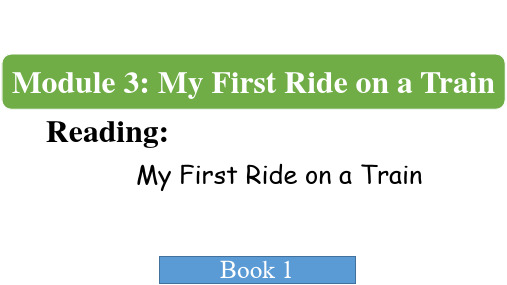
请同学们记笔记!
a.at/from a distance 从远处,遥远地
Eg:
This picture looks more beautiful at a distance. b.in the distance 在远处,在远方
Eg:
There is a hill in the distance.
camel
Beautiful Scenery in Perth:
Diamond Tree
Diamond
If you plan to travel from Sydney to Perth via Melbourne and Adelaide
What kind of transportation would you like to choose?
7,740,000k㎡
3. Do you know the longest distance from the east to the west?
3860km
3860km
4. How much do you know about beautiful scenery in Australia?
Beautiful Scenery in Sydney:
1. Did Alice travel on the train before?
2.Where is the Alice's destination?
3.Was the scenery the same during the whole journey? 4. What did Australians use to travel to the central part of this country? and why? 5. Do Australians still use camels to deliver goods?
外研版高中英语必修一英语Module3MyFirstRideonaTrainSectionⅢ.docx
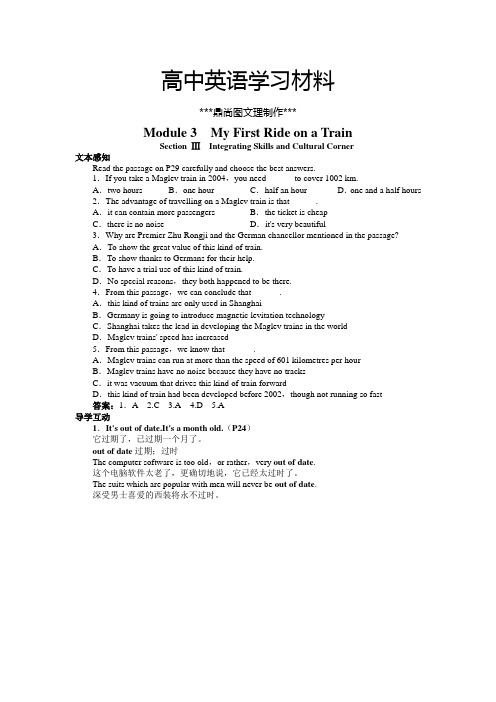
高中英语学习材料***鼎尚图文理制作***Module 3My First Ride on a TrainSection ⅢIntegrating Skills and Cultural Corner文本感知Read the passage on P29 carefully and choose the best answers.1.If you take a Maglev train in 2004,you need ______to cover 1002 km.A.two hours B.one hour C.half an hour D.one and a half hours 2.The advantage of travelling on a Maglev train is that______.A.it can contain more passengers B.the ticket is cheapC.there is no noise D.it's very beautiful3.Why are Premier Zhu Rongji and the German chancellor mentioned in the passage?A.To show the great value of this kind of train.B.To show thanks to Germans for their help.C.To have a trial use of this kind of train.D.No special reasons,they both happened to be there.4.From this passage,we can conclude that ______.A.this kind of trains are only used in ShanghaiB.Germany is going to introduce magnetic levitation technologyC.Shanghai takes the lead in developing the Maglev trains in the worldD.Maglev trains' speed has increased5.From this passage,we know that ______.A.Maglev trains can run at more than the speed of 601 kilometres per hourB.Maglev trains have no noise because they have no tracksC.it was vacuum that drives this kind of train forwardD.this kind of train had been developed before 2002,though not running so fast答案:1.A 2.C 3.A 4.D 5.A导学互动1.It's out of date.It's a month old.(P24)它过期了,已过期一个月了。
外研版高中英语必修1 Module 3《My First Ride on a Train》Secti
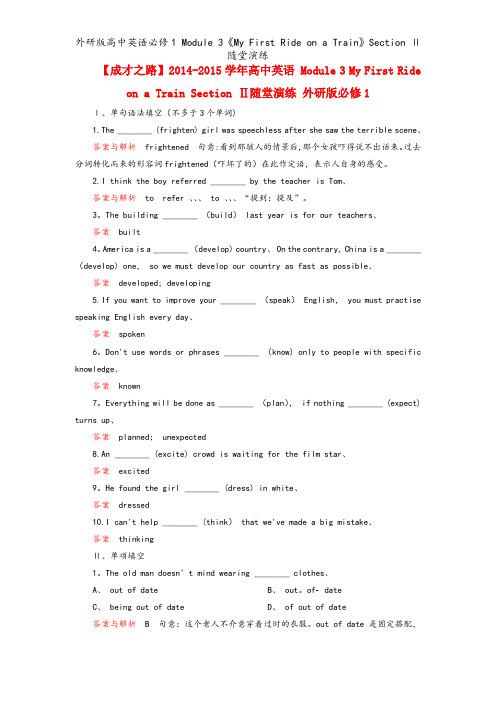
【成才之路】2014-2015学年高中英语 Module 3 My First Ride on a Train Section Ⅱ随堂演练外研版必修1 Ⅰ、单句语法填空(不多于3个单词)1.The ________ (frighten) girl was speechless after she saw the terrible scene、答案与解析frightened 句意:看到那骇人的情景后,那个女孩吓得说不出话来。
过去分词转化而来的形容词frightened(吓坏了的)在此作定语,表示人自身的感受。
2.I think the boy referred ________ by the teacher is Tom、答案与解析to refer 、、、 to 、、、“提到;提及”。
3。
The building ________ (build) last year is for our teachers、答案built4。
America is a ________ (develop) country、 On the contrary, China is a ________ (develop) one, so we must develop our country as fast as possible、答案developed; developing5.If you want to improve your ________ (speak) English, you must practise speaking English every day、答案spoken6。
Don't use words or phrases ________ (know) only to people with specific knowledge、答案known7。
Everything will be done as ________ (plan), if nothing ________ (expect) turns up、答案planned; unexpected8.An ________ (excite) crowd is waiting for the film star、答案excited9。
高中(外研版)英语必修1课件:Module 3 My First Ride on a Train3

谢谢观看!
英语 必修1
Module 3 My First Ride on a Train
You made my day!
一古 个人 在云 路: 上“ 。读 ”万 从卷 古书 至, 今行 ,万 学里 习路 和。 旅” 行今 都人 是说 相: 辅“ 相要 成么 的读 两书 件, 事要 。么 。旅
行 , 身 体 和 灵 魂 总 要 有
To get around within a city or a region,you need to depend on local transport.However,in every continent,every country,and even in every city, the local public transport systems are different.When travelling in the big cities, for example,in Europe,you are advised to learn the specific details of the local subway or bus system of each city.
around. To travel from one destination to another,most people prefer to travel by
train.Trains are comfortable,without sudden movements,and mostly you can move around in them.Iቤተ መጻሕፍቲ ባይዱ some countries , however , there are few or no railways.To travel between destinations there,you will have to take the bus.
高中英语外研版必修一《module 3 my first ride on a train》课件
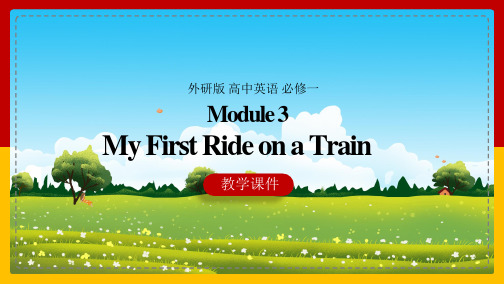
点拨 (1)in the distance在远方 at/from a distance从远处;隔开一段距离 within walking distance 步行可到达的地方 keep sb. at a distance与某人疏远 keep one’s distance from...与……保持距离
据报道将有一个对新任州长的采访。 ④We interviewed ten people for the job. 我们为这份工作面试了十人。 ⑤Next week, I will be interviewing Spielberg about his latest movie. 下周我将拜访斯皮尔伯格,谈论他的最新电影。
(2)distant adj.遥远的;远处的 a distant village一个遥远的村庄 a distant relative一个远房亲戚 【点津】对于distance的提问多用what,而不用how far。
2. abandoned adj.被抛弃的;放纵的 教材原句 ①We saw abandoned (abandon) farms which were built more than a hundred years ago. ◆用abandon的适当情势填空 ②However, these plans were abandoned because of financial problems.
外研版 高中英语 必修一
Module 3
My First Ride on a Train
教学课件
重点单词
1. distance n.距离;远方;遥远;疏远 v.与……疏远 教材原句 ①I first travelled a long distance (长途旅行) by train when I was six years old.
外研版高中英语必修一Module3MyFirstRideonaTrain
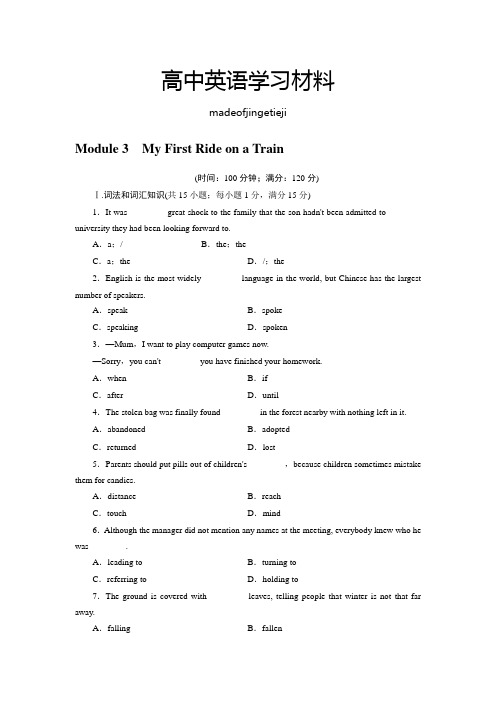
高中英语学习材料madeofjingetiejiModule 3My First Ride on a Train(时间:100分钟;满分:120分)Ⅰ.词法和词汇知识(共15小题;每小题1分,满分15分)1.It was ________ great shock to the family that the son hadn't been admitted to________ university they had been looking forward to.A.a;/B.the;theC.a;the D./;the2.English is the most widely ________ language in the world, but Chinese has the largest number of speakers.A.speak B.spokeC.speaking D.spoken3.—Mum,I want to play computer games now.—Sorry,you can't ________ you have finished your homework.A.when B.ifC.after D.until4.The stolen bag was finally found ________ in the forest nearby with nothing left in it.A.abandoned B.adoptedC.returned D.lost5.Parents should put pills out of children's ________,because children sometimes mistake them for candies.A.distance B.reachC.touch D.mind6.Although the manager did not mention any names at the meeting, everybody knew who he was ________.A.leading to B.turning toC.referring to D.holding to7.The ground is covered with ________ leaves, telling people that winter is not that far away.A.falling B.fallenC.fell D.fall8.—Would you mind ________ him the news? I want to give him a surprises.—Of course not.A.not tell B.not to tellC.not telling D.don't tell9.I used to play table tennis, but now I'm ________ because of work.A.out of date B.out of practiceC.out of danger D.out of place10.In my________,you shouldn't follow the man's advice.A.scene B.sceneryC.sight D.view11.—Would you please drive more quickly? My plane will ________ in twenty minutes.—I want to, but safety comes first.A.take up B.take offC.take down D.take out12.The sudden sound really ________ the animals, so they ran away as quickly as possible.A.frightened B.satisfiedC.interested D.impressed13.________ from days of walking, the young man hardly had any strength to continue with his journey.A.Exhausted B.BoredC.Disappointed D.Worried14.—Do you have anything planned for this afternoon?—Yes. I'm going to ________ a famous NBA player.A.interview B.coverC.impress D.revise15.—Will you go to the concert tonight?—________.It's the one that I have been looking forward to.A.Absolutely B.It dependsC.All right D.Well doneⅡ.完形填空(共20题;每小题1分,满分20分)I'm an American. Years ago,I travelled to the north of Thailand.I __16__ the heat,the noisy streets,the busy markets and the smell of Thai dishes. I enjoyed my __17__ there very much. However,there is one thing that I wish I hadn't done.One day,I set off from my hotel to a temple that __18__ me.It was a very __19__ day.As I walked past some buildings,I glanced between two __20__ buildings.There,an old woman intraditional clothing __21__ on the dusty rubble (碎石).The terrible thought crossed my mind that she might be __22__.Feeling quite helpless,I __23__ her.Her face was sun-kissed. She looked quite beautiful but very ill.I __24__ reached into my pocket to find some __25__.Then I pushed it into her hand. It was enough for her to __26__ for a few months. At this moment,she opened her large,brown eyes and __27__ the prize I'd given her. I felt like the“__28__ stranger”.__29__ a common language,she looked at me with the wisdom and pity that could burn into a soul. She weakly __30__ the money. She stood up and walked away.I was __31__,with the money in my hand. It took me at least a kilometer of walking to __32__ I was quite the fool. She didn't need money.__33__ she needed shade,a bottle of water or just some comfort. She was the one who taught me a good __34__.That evening,I sat thinking over my “kindness”.This beautiful woman made me know that not everyone would __35__ someone else's money. We should be kind to others,but we should choose the right way.16.A.preferred B.lovedC.expected D.disliked17.A.style B.stayC.idea D.way18.A.bored B.scaredC.needed D.interested19.A.cold B.warmC.cool D.hot20.A.beautiful B.unfinishedC.wonderful D.common21.y B.satC.stood D.walked22.A.hungry B.deadC.thirsty D.sleepy23.A.went up to B.looked down uponC.ran away from D.took care of24.A.strangely B.luckilyC.unwillingly D.immediately25.A.fruit B.paperC.money D.food26.A.live B.workC.see D.wear27.A.looked for B.took awayC.went through D.looked at28.A.careful B.kindC.exciting D.pretty29.A.Without B.WithC.Like D.For30.A.watched out B.threw awayC.put away D.pushed back31.A.high B.excitedC.happy D.surprised32.A.show B.rememberC.realize D.tell33.A.Finally B.SometimesC.Usually D.Maybe34.A.word B.lessonC.saying D.thought35.A.accept B.hideC.consider D.refuseⅢ.阅读理解(共20小题;每小题2分,满分40分)ATo see the world is one thing;to have someone to share it with is another. Indeed,travel becomes more interesting when you have a travel partner. A travel partner can be a close friend,a family member,a pal you've met online,or a business friend.You can have someone to talk toTraveling alone is fun,but wouldn't you feel lonely?Having a travel partner can remove the feeling of loneliness. This is especially true if you can get a travel companion who is very familiar with the place you're traveling to. You don't have to ask any information from the locals,and you can increase the time you spend in the country.______________________________________One of the major headaches in travelling is the costs involved. You can't simply ignore the rising price of hotels or plane tickets. You should also think about your daily needs,such as your food. Of course,you can't simply go back without bringing any souvenirs (纪念品) to your friends and family. All these can ruin your budget. However,when you have a travel friend,you can have someone to share the expenses with.You can meet a good friendHaving a travel mate is a good way of meeting a new friend or even a lifelong partner. You can never count the number of couples who actually found their way into each other's heart while travelling together in another country.You can have someone to watch out for youWhen you're in a foreign land,you'll never be really safe. You don't know the rules as well as the culture of the people. A travel mate will be perfect to remind you of your duties in the country and to watch your back just in case you get lost. So why don't you find a travel companion now?Let's find out how...36.What's the author's purpose in writing this passage?A.To introduce a travel company.B.To encourage us to have a travel partner.C.To explain how to be a perfect travel partner.D.To tell an interesting experience with a travel partner.37.What's the BEST title for the 3rd paragraph?A.You can have someone to share the expenses with.B.You can know the local culture well.C.You can enjoy food with your partner.D.You can save money by bargaining together.38.Which of the following statements agrees with the author's opinion?A.Travelling alone is not fun.B.Buying souvenirs isn't necessary.C.Many people fall in love when travelling.D.It's better to choose a stranger as a travel partner.39.Which of the following things is NOT mentioned?A.A travel partner can help you take care of your child.B.A travel partner can help get rid of loneliness.C.A travel partner can help you save money.D.A travel partner can make you safer.40.The following paragraph will probably talk about ________.A.how to get along with a travel partnerB.how travel can benefit peopleC.what we can learn from travelD.how to find a travel partnerBSitting in the play area of the doctor's office,my children,Paul,four,and Bailey,three,built a Lego tower while we waited to be called for Paul's examination.“Good job,you guys,”I said,trying not to sound too tired. My husband was away on business,and it was difficult being alone with the kids. At times I felt like I was living in the jungle (丛林) rather than the suburbs.“Don't put the Lego in your mouth,Bailey,” I said. Paul grabbed (抓取) it from him. “That's not nice,Paul,” I said. He gave back the Lego. I looked around the waiting room. A woman was eating something,a couple were talking,and an old gentleman in a blue jacket was reading a magazine. I wished I could sit quietly for a while. I wanted to be able to take a rest,or go shopping alone. At once,I was ashamed of myself. What kind of mother was I?“God,” I thought,“help me to be the very best mom I can be.”The nurse came into the waiting room to get us. Just at that moment,the old gentleman in the waiting room put down his magazine and came up to me. With a smile on his face,he said,“Your children are most certainly lucky to have such a wonderful mother.” “Thank you,”I replied in a low voice and watched him walk back to his seat. We followed the nurse into the examination room. While she weighed Paul,I told her how that man had made my day.Motherhood is still a jungle sometimes,but now when I feel tired I remember the encouraging words of the old gentleman.41.The writer went to the doctor's office because ________.A.one of her children liked to play thereB.her son Paul needed an examinationC.she was tired and needed to see her doctorD.she wanted to have all her children examined42.From Paragraph 2,we know the writer felt that looking after her children alone was ________.A.unfair B.happyC.hard D.interesting43.The writer criticized Paul when he ________.A.put the Lego into Bailey's mouthB.took away the toy from BaileyC.made trouble in the waiting roomD.didn't follow her advice44.In the old gentleman's opinion,the writer ________.A.lived a very hard lifeB.was a very good motherC.didn't love her children enoughD.was lucky to have so lovely children45.What can we learn from the passage?A.The writer often went shopping alone.B.The writer's husband was always on business.C.The writer doesn't know how to be a good mother.D.The writer was greatly encouraged by the old gentleman's words.CMy friend Jason and I wanted to do something to help other people who are less fortunate and help us grow at the same time. After we decided that we would volunteer in Nepal, I did some research on the Internet and I found V olunteer Nepal and felt strongly that it was the right choice for us.While making our plans, Jason and I realized that others might like the opportunity to be a part of our experience. So before leaving for Nepal, we asked the people we know whether they would be interested in donating(捐赠) cash or goods to Nepal Orphans(孤儿) Home. One friend, whose family owns a chain called Drake Supermarket, told others about it. His effort paid off: We received donations that filled 29 boxes with sporting goods, toys, coloring books, pencils, children's books, and more. The boxes were later taken to Drake's warehouse where I prepared them for shipment. Drake agreed to ship them to Nepal for free.The boxes had arrived at the V olunteer House when we arrived there. The next day, Jason and I unpacked the boxes. The children from the orphanages lined up and were each able to choose a gift. This process took about an hour, but the looks on their faces and the happiness that we saw in their eyes made it one of the best days of our life.We visited the orphanages there in the following days. Being with the children at the orphanages was both sad and wonderful. I'm sure that anyone who has volunteered will understand what I mean by that. My experience as a volunteer was very rewarding(有益的). It has changed me as a person and the way I viewed life in the past.46.The writer did some research on the Internet probably to ________.A.get in touch with some studentsB.find an organization for volunteersC.decide in which country to volunteerD.find some friends to volunteer with him47.Before leaving for Nepal, the writer ________.A.asked his friends to go with himB.filled 29 boxes with the things he boughtC.received many donations from other peopleD.bought many things in Drake Supermarket48.What did Drake Supermarket do to help the writer?A.It donated many sporting goods.B.It helped call Nepal Orphans Home.C.It helped keep the boxes at a low price.D.It helped ship the boxes to Nepal for free.49.What can we learn from Paragraph 4?A.The children were very happy to receive the gifts.B.The writer didn't expect the kids would love the gifts.C.The writer and his friend took the gifts to the orphanages.D.The children had never received gifts from others before.50.The writer thinks that his experience as a volunteer was________.A.useless B.helpfulC.boring D.disappointingDPeople who like travelling have their reasons. They believe that travelling can help them expand their field of view,especially in the geographical and historical sense. They also think that touring will give them more chances to enjoy different kinds of food and experience new things that would never be brought by other activities. But those who dislike travelling also have some reasons.Travelling,in my opinion,does more good than harm. Most importantly,it broadens (使扩大) our mind. We can get in touch with other civilizations (文明),cultures,customs and ideas.Through history,most people travelled because of necessity (必要性)—not for pleasure. People travelled just in order to remain alive. They searched for food to eat or places to live in. They sometimes ran away from enemies. This is not to say that no one ever travelled just for the fun of it. In ancient times,for example,rich Romans travelled all the way to Greece to take part in the Olympic Games,and festivals. Of course,some people decided to travel just out of curiosity (好奇心).They wanted to find out what it looked like beyond the horizon(地平线).Also business travel has been going on for centuries. Traders could not only make money but also learn to speak several languages and be introduced to different cultures.So,travelling does enrich our mind and draw new ideas to us. There is no doubt that we can get much from it.51.The underlined word “expand” in Paragraph 1 can be replaced by “________”.A.widen B.protectC.lose D.decide52.According to the passage,in the past most people travelled ________.A.for fun B.for knowledgeC.to get experiences D.to make a living53.How many reasons for travelling are mentioned in Paragraph 3?A.Three. B.Four.C.Five. D.Six.54.In the writer's opinion,travelling can be ________.A.expensive B.funnyC.helpful D.tiring55.What's the main idea of this passage?A.Different kinds of travelling.B.Travelling enriches our mind.C.Ways to enjoy yourself while travelling.D.The advantages and disadvantages of travelling.Ⅳ.阅读表达(共5小题;每小题3分,满分15分)Malls are popular places for Americans to go. Some people spend so much time at malls that they are called “mall rats”. Mall rats shop until they drop in the hundreds of stores.People like malls for many reasons. They feel safe because malls have police stations. Parking is usually free, and the weather inside is always fine.The newest malls have beautiful rest places with waterfalls and large green trees.The largest mall in the United States is the Mall of America in Minnesota. It covers 4.2 million square feet. It has 350 stores, 8 nightclubs, and a large park! There are parking spaces for 12,750 cars. About 750,000 people shop there every week.The first indoor mall in the United States was built in 1965 in Edina, Minnesota. People love doing all their shopping in one place. More malls are built around the country. Now malls are like town centers where people ________.They shop, of course, they also eat in food courts (广场) that have food from all over the world. They see films at theaters. Some people even get their exercise by doing the new sport of “mall walking”. Others go to malls to meet friends.In some malls, people can see a doctor and even go to the church. In other words, people can do just about everything in malls. Now people can live in their favorite shopping center in fact.56.Why do people like malls? (no more than 10 words)________________________________________________________________________ ________________________________________________________________________ 57.What does “mall” mean here? (no more than 5 words)________________________________________________________________________________________________________________________________________________ 58.Except shopping, what else can people do in the mall? (no more than 30 words)________________________________________________________________________ ________________________________________________________________________ 59.Please fill in the blank in the fourth paragraph with proper words or phrases to complete the sentence.(no more than 10 words)________________________________________________________________________ ________________________________________________________________________ 60.What is the BEST title of this passage? (no more than 8 words)________________________________________________________________________ ________________________________________________________________________ Ⅴ.写作(满分30分)假设你和父母去年寒假去了海南旅行。
外研版高中英语必修1Module3 My First Ride on a train
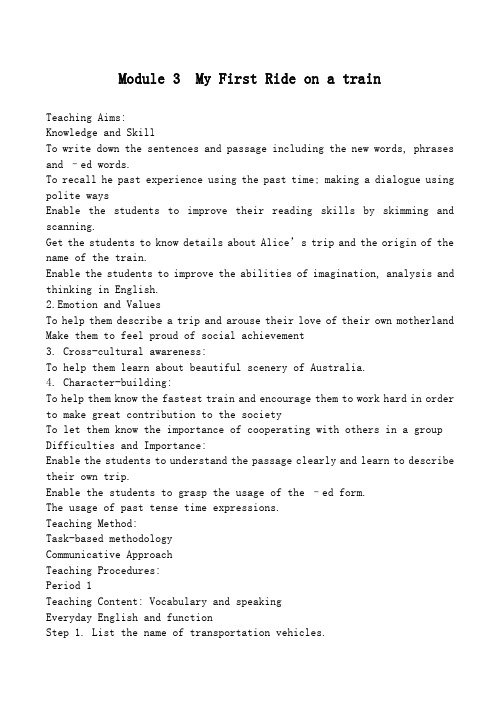
Module 3 My First Ride on a trainTeaching Aims:Knowledge and SkillTo write down the sentences and passage including the new words, phrases and –ed words.To recall he past experience using the past time; making a dialogue using polite waysEnable the students to improve their reading skills by skimming and scanning.Get the students to know details about Alice’s trip and the origin of the name of the train.Enable the students to improve the abilities of imagination, analysis and thinking in English.2.Emotion and ValuesTo help them describe a trip and arouse their love of their own motherland Make them to feel proud of social achievement3. Cross-cultural awareness:To help them learn about beautiful scenery of Australia.4. Character-building:To help them know the fastest train and encourage them to work hard in order to make great contribution to the societyTo let them know the importance of cooperating with others in a group Difficulties and Importance:Enable the students to understand the passage clearly and learn to describe their own trip.Enable the students to grasp the usage of the –ed form.The usage of past tense time expressions.Teaching Method:Task-based methodologyCommunicative ApproachTeaching Procedures:Period 1Teaching Content: Vocabulary and speakingEveryday English and functionStep 1. List the name of transportation vehicles.on roads: taxis, bicycles, motorbikes, buses, cars, tractors, trucks…on rails: trams, trains…on water: ferries, ships, boats, rafts(筏子), canoes(独木舟)…in the air: helicopters, planes, aeroplanes, spaceships, rockets…Long distance: planes, train, shipsferry, planeget into/get out of: taxi, helicopter,ride: bicycle, motorbike,drive: taxi, train, bus,take off/land: plane, helicopterStep 4. Describe the first time you traveled a long distance, including the following information such as your age, where you went and who accompanied and so on.Step 5. Everyday EnglishComplete each sentence with one of the expressions.Goodness Definitely!Interviewer: ________, did you enjoy making films?Mary Lennon:_________! It was good fun! Sometimes we made three films in a week.Interviewer:_________! Weren’t you bored?Mary Lennon:___________! It was good fun.Interviewer: ________? But weren’t you tired?Mary Lennon:______________! We were exhausted. We had to get up at 4 a.m. and we didn’t go to bed until midnight.Interviewer:___________. That’s a long time.Mary Lennon:___________! It takes a long time to make a film. Homework:Preview the text “My First trip On a train”.Period 2Teaching content: Reading and VocabularyStep 1 Warming up(brainstorming)Answer the following questions:Situation : If you go to Beijing in 2008, how will you get there? Why do you choose to go by …?(The Ss’ answers are free. After a while, go on asking the following questions:Do you think it is wonderful if we go by train?What do you want to do on a train?)Suggested answers:Play cardsTalk to other passengersEnjoy the food on the trainEnjoy the scenery along the tripRead booksListen to music…Step 2 pre-readingLook at the pictures on page 22, and answer the following questions. 1.Where do you think they were taken?Australia.2. Do you know how many people live there?About 20 million.3. Do you know the name of the capital city?Canberra.4. Where do you think most of the people live, in the central part of the country or on the coast?On the east/ southeast coast.5. What do you think the central part of the country is like?Desert.6. What Australian animals do you know about?Koala bear, duck-billed platypus, kangaroo, dingo…Step3 Detail Readinga. Skimming and scanning: read the text fast, try to find the answers to these questions.1. How old is the writer?2. When was a law which allowed people to shoot the animals if they werea problem passed?3. What’s the passage about?Suggested answers:1. 18 2. In 1925 3. Traveling to the central part of Australia.( ) ate meals cooked by experts( ) made friends with other passengers( ) talked to other passengers( )sang songs( )read books( )watched the night skyd. Answer the following questions:What’s Alice’s destination?Was the scenery the same during the whole journey?What did she do while she was on the train?What did the Australians use to travel to the central part of the country? They don’t use camels to deliver goods now, do they?Suggested answers:Her destination was the central part of Australia.No, it wasn’t.She read books and listened to her Chinese cassettes while she was on the train.The Australia used camels to travel to the central part of the country. No, they don’tStep 4 Post readingPara 1:Information about the writer and her train ride.Para 2: What the writer saw on the train.Para 3: What the writer did on the trainPara 4: Why is the train called the Ghan?Para 5: The use of camels.Para 6: What happened to the camels.b. Reading Comprehension1.What means of transportation were used in the Middle part of Australia? _____A. horsesB. camelsC. trainD. all of the above2. Australians used camels instead of horses, because______.A. horses didn’t like the hot weather and sandB. they bought some camels from Afghanistan.C. Camels were much better than horses for traveling a long distanceD. Both A and C3. Australians used to travel on camels for ________.A. businessB. tourC. farmingD. animal training4. The writer talked a lot about camels, because________.A. camels are of great use in traveling and quite helpful for manB. she was planning to travel on a camel with her friend soonC. readers are often interested in stories about animalsD. the writer wanted to explain why the train was called Ghan.5. Which of the following is true?_____A. The police shot the trained camels with the permission of the government.B. The Afghanistan government passed a law to shoot trained animals.C. The writer used to travel long distances on a train alone. Suggested answers: D D A D AStep 5 Key points1. in the distance / at a distanceTrees should not be planted close together but at a distance.He had disappeared in the distance before I could greet him.2. abandonedHe abandoned his house to the new comers.Don’t just abandon yourself to a life of pleasure.Because of the crowd trouble, the match was abandoned3. desert n & vdesert a house/ a village/ one’s wife and children4. exhausted adj.He was totally exhausted after the long ride through the desert.5. supply v & nsupply sth. to / for sb.supply sb. with sth.The company supplies us with electricity and gas.Helicopters dropped supplies (of food and clothing) to the villagers. 6. allow vt. & vi.permit sb to do or let sth happen sth .allow sb. to do sth.They are not allowed to smoke in the office.They don’t allow smoking in the hospital.The doctor allowed him up for two hours only, for he is still in poor health.7. refer toThe expert referred to at the meeting is Dr. Li.The discipline refers only to soldiers.The new law only refers to the camels used for delivering food.8. more than oneMore than one visitor likes the scenery here.9. on the coast ~ off the coast.Soon the ships appeared off the coast.There are some hills on the coast and you can see some islands off the coast.10. be short for.WTO is short for the World Trade Organization.be short of = lackThough they are short of money, his parents managed to send him to college.11. in the 1920s / in the 1920’sin the 20’s / 20sin one’s 20s12. at a speed over 400 kilometers per hourat a / the speed of 1000 meters a second.at full / top / high speedat the top of one’s speedwith speed / with great speed.Homework:Retell Alice first ride on a train.Period 3Teaching Content: Grammar 1 The –ed formFunctionListeningStep 1 PresentationRead the sentences from the passage then answer the questions.Trained camels carried food and other supplies.We saw abandoned fans which were more than a hundred years ago.We ate great meals cooked by experts.Questions: 1. Trained, abandoned and cooked are adjectives, but they are also past participles of verbs. What are the infinitives of the verbs? What is the word order of the underlined parts of the other two sentences? Why is it meals cooked by experts and not cooked meals by experts? Suggested answers:The infinitives of the verbs are : to train, to abandon, to cook.1&2: adjective +noun; 3:noun.+adjectiveThe word “cooked”can’t go in front of the noun “meals” because it refers directly to the phrase which follows it(by experts) –the people who cooked the meals- and we are interested in the information.Step 2 PracticeLook at the sentences, pay attention to the function of “-ed form”. Marry seems worried at the news.The door remained lockedThe teacher felt pleased with the student’s answer.The bottles are broken.Everything is settled now.Step 3 Watch and Compare1. There are many fallen leaves on the ground.This is a book written by a peasant.2. The book is well written.The book was written by a woman.3. The ground is covered with snow.This point has not been covered yet.4. This point has not been covered yet.The enemy was soon surrounded by us.Step 4 Watch and Compare(-ed form and –ing form)They all felt excited when they heard the exciting news.We all felt tired after the work, because the work is tiring.Nobody was interested in the story.The story he told was very interesting.Step 5 Practicepuzzled puzzlingThe problem seems quite _________.The teacher seems _________ about what to do next.interested interestingWhat seemed to me most __________ was that no one thought of his own safety. The students were __________ to hear the news.Step 6 Functiona. Read the conversation between a ticket inspector and a passenger on the train. Then answer the following questions.What does the ticket inspector want?What is happening?b. Discuss the questions.What do you think of the ticket inspector’s attitude?What expressions could you use to change it?c. Pair work.Work in groups to practise the conversation with the polite expressions. Excuse me…Could I (see your ticket)?Could I possibly (see your ticket)?Would you mind (if I say your ticket)?I’m sorry but (This is an old ticket.)The fact is that (it’s out of date.)Add more lines to the conversation. The following sentences may help you. What time does the train arrive at…?Where do I change to get to …?Is it possible to open the window?Is there a dining car on this train?Step 7 Listeninga. Pre-listening: Look at the picture, do you know this great woman?b. While-listening: Play the tape for the first time. Show the questions on the screen.Q1: when did she first go to America?Q2: How old was she?Q3: How did she get there?Q4: What did she do in New York?Q5: How did she get from New York to California?Q6: Where did she stop on the way?Q7: What did she think of Los Angeles?C. Post-listeningMatch the questions and answers.Where were you born?When did you go to America?Were you sick?How did you get to California?Were you and your friends bored?Did your friends go to California with you?a. When I was 19.b. on, I wasn’tc. By train.d. In Londone. No, they didn’t.f. Yes, we were.Homework:Finish the exercises 1,2,3 of page 79.Period 4Teaching Content: VocabularyReading and SpeakingGrammar 2Step 1 VocabularyRead the places and activities. Can you remember the first experience of them?Places: cinema circus kindergarten park playgroundseaside sports stadium swimming pool theatre zooActivities: learning to ride a bicycle, seeing a wild animal, seeing a film, learning to draw, reading comic books, swimming, playing sports for the first time, meeting your best friendStep 2 Reading and speakinga. Lead-inDo you remember your first visit to the zoo?Did you see wild animals?What wild animals did you see?Brainstorming: ask Ss to say something about their childhood.b. Read the passage individually and then decide which are happy and which are unhappy.c. PracticeTell the others about the first time they did one of the activities. Put the Ss into groups to talk about their first experiences.Step 3 Past tense time expressionsa. Find the following time expressions that appea r in “My First Ride on a Train.”Recently… A ling time ago…During the day… A hundred and fifty years agoOne night… Until the 1920sAt (about) midnight In 1925Which of them can refer to past or present actions?b. Recently: Alice went on her first long-distance train ride.During the day: She sat and looked out of the window.One night at about midnight: She watched the night sky for an hour.A long time ago: Australians needed a way to travel to the middle of thecountry.A hundred and fifty years ago: They bought some camels from Afghanistan. Until the 1920s: The camels carried food and other supplies across the street.In 1925: The government passed a law allowing people to shoot camels if they became a problem.c. Ask students to write down two sentences for during the day and at midnight.During the day:_______________________________At midnight:_________________________________d. Practice1. I first met Tom ten years ago. He _______in a radio factory at that time.A. had workedB. has workedC. was workingD. has been working2. His father gave up smoking for only 3days, but then ______ to his old ways.A. returnedB. returnsC. had returnedD. has returned3. I used to drink a lot of tea but thesedays I _______ coffee.A. preferB. preferredC. had preferredD. am preferringSuggested answers: C A AHomework:Write your description of a trip. Use the past tense and include some expressions, such as “On the first day…”, “After lunch…”, etc. Period 5Teaching Content Cultural CornerWritingStep 1. RevisionAsk some student to say something about Alice Thompson’s ride on a train. Ask them to say as much as possible.Step 2 Lead-inAlice Thompson traveled on a train. Do you know the speed of an ordinary train?(Less than 200 kilometers an hour.)Do you want to know a train about two times faster?Step 3 Skimming and ScanningQ1. How long does it take the Maglev to complete the 30-minute journey? Q2. Where does it run between?Suggested answers: 1. In 8 minutes.2. Between Shanghai’s Pudong Airport and Longyang Station in downtown Shanghai.Step 4 Detail readingQ1. What are the main differences between a magnetically levitated train and an ordinary train?Q2. What are the advantages of traveling on a Maglev train?Suggested answers:It is faster, less noisy and uses less energy.You travel very quickly and quietly. The train uses less energy.Step 5. key points of the textat full speedat a speed of 50 milesat the top of one’s voiceper hour; per minute ;per day ;per year…attended the opening ceremony of the train service.attendDid you attend the meeting yesterday?She was sick, so she didn’t attend her class.Step 6 WritingWrite a paragraph about one of these topicsA My first family holiday B. The most unusual journey I’ve madeC. My first train rideD. The best journey of my lifeHomework:Talking about a trip you made to a tourist spot。
外研版高中英语必修1Module 3My First Ride on a Train
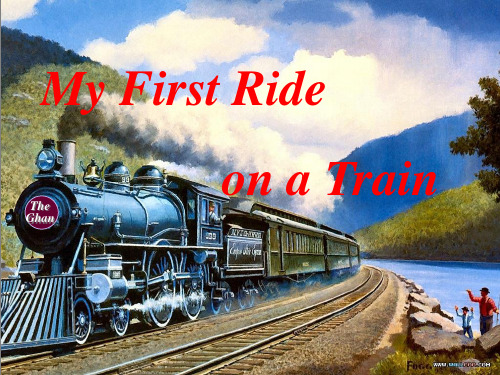
Fast reading Match the main idea wi.
Para 4. Para 5. Para 6.
What did I see on the train? What did I do on the train? I had my first ride on a longdistance train. What were the camels used to do?
They g_o_t_o_n___in Sydney where andg_o_t__of_f_ in Alice Springs, which
is_in__th_e_m__id_d_l_e of Australia
Recently, she had her _fi_rs_t ride on a how _lo_n_g_-_d_is_ta_n_c_e train,the famous Ghan
What happened to the camels in the 1920s? Why is the train called the Ghan?
Careful reading
Read para.1 and fill in the table
who
Alice, an __18_-_ye_a_r_-o_ld____ girl, comes from_S_y_dn_e_y__ ,together with a friend
My First Ride
on a Train
The Ghan
Sydney Opera House
Do you know what it is?
kangaroo
Koala bear
platypus
Kangaroos
外研版高中英语必修一Module3MyFirstRideonaTrain典句精讲
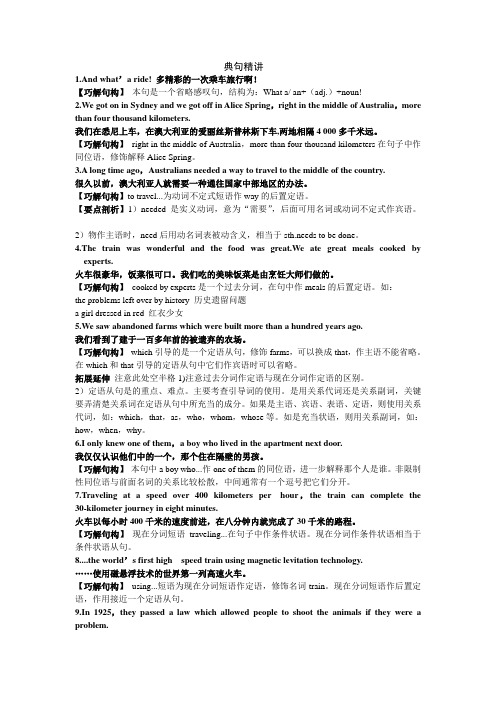
典句精讲1.And what’a ride! 多精彩的一次乘车旅行啊!【巧解句构】本句是一个省略感叹句,结构为:What a/ an+(adj.)+noun!2.We got on in Sydney and we got off in Alice Spring,right in the middle of Australia,more than four thousand kilometers.我们在悉尼上车,在澳大利亚的爱丽丝斯普林斯下车,两地相隔4 000多千米远。
【巧解句构】right in the middle of Australia,more than four thousand kilometers在句子中作同位语,修饰解释Alice Spring。
3.A long time ago,Australians needed a way to travel to the middle of the country.很久以前,澳大利亚人就需要一种通往国家中部地区的办法。
【巧解句构】to travel...为动词不定式短语作way的后置定语。
【要点剖析】1)needed是实义动词,意为“需要”,后面可用名词或动词不定式作宾语。
2)物作主语时,need后用动名词表被动含义,相当于sth.needs to be done。
4.The train was wonderful and the food was great.We ate great meals cooked by experts.火车很豪华,饭菜很可口。
我们吃的美味饭菜是由烹饪大师们做的。
【巧解句构】cooked by experts是一个过去分词,在句中作meals的后置定语。
如:the problems left over by history 历史遗留问题a girl dressed in red 红衣少女5.We saw abandoned farms which were built more than a hundred years ago.我们看到了建于一百多年前的被遗弃的农场。
- 1、下载文档前请自行甄别文档内容的完整性,平台不提供额外的编辑、内容补充、找答案等附加服务。
- 2、"仅部分预览"的文档,不可在线预览部分如存在完整性等问题,可反馈申请退款(可完整预览的文档不适用该条件!)。
- 3、如文档侵犯您的权益,请联系客服反馈,我们会尽快为您处理(人工客服工作时间:9:00-18:30)。
教学环节
教学过程
show the pictures about Australia on the screen and ask the Ss to say one or two sentences about Australia. Show the questions about Australia 1. Before we read the text, let’s look at the words in Activity 2 on P22. Match some of the words in the box with the 6 definitions. 2.read the passage quickly and get a general idea abe 3 My first ride on a train
课
标
教 材
学情 分析
教学 目标
重点 难点
教学 策略
教学 过程
1
《英语新课程标准》要求
英语课程的分级目标
高中英语课程的任务 激发和培养学生的创新精神 和独立的思维,实践能力,努力 使学生获得适应学习化社会所需 要的英语基础知识和基本技能, 了解文化差异,发展健全人格, 培养合作精神和社会公德意识。 教材遵循“题材——功能——结 构——任务”的编写原则,以题 材为纲,以运用性任务为目标, 避免独立的语言形式操练,把不 同形式的技能训练结为一体,以 综合的方式体现实际生活中有意 义的语言应用
The 2nd Period Reading
难点
Enable the Ss to find the clues
of the writer’s first ride on a train
教 学 策 略
一、创设英语学习的
教学情境。
中国学生缺乏英 语学习的氛围,因 此,我们教师就应 在课堂教学活动中 创设激发学生学习 兴趣的教学情景, 提高学生参与教学 活动的主动性,我 们要善于利用各种 实物、图片、影像 去创造直观的教学 情境,让学生身临 其境。
七级 对英语学习表现出积 极性和自信心。能听懂熟悉 话题的语段。能就熟悉的话 题交换信息。能参照范例或 图片写出相关的文章。能参 与简单的角色扮演等活动。 能尝试使用适当的学习方法, 克服学习中遇到的困难。能 意识到语言交际中存在的文 化差异。
教材内容分析
本模块通过旅游经历介绍风光特色,帮助学 生学会关于交通工具和地貌等自然现象的词语 ,学会运用过去的用语作回忆,写游记,介绍 风光。
Step1. Lead-in
Step2. reading
教学环节
语言技 能目标
情感态度
对祖国大好 河山的热爱,为 祖国先打企划建 设的成就感到骄 傲,对世界各地 地貌特色的熟悉 和风土人情的尊 重,提倡文明, 讲究礼貌。
语言知 识目标
情感 态度
教学目标
Deal with the questions
in Activity 4 on P24.
Module 3
My First Ride on a Train
语言知识目标
1.词汇: 2.功能:学会礼貌用语 3.语音:练习读句子中 的重音 4.语法:学习-ed形式 作形容词,学习过 去时间的表达法
语言技能目标
1.听:识别所学生词,短 语和含有-ed的形容词 ,听懂对过去事件的 回忆并获取信息。 2.说:熟练的运用过去时 间表达法进行回忆, 熟练的介绍旅游和地 貌风光 3.读:理解模块提供的和 来自同学介绍旅游的 材料并获取信息 4.写:熟练完成模块所要 求的各种书面练习
B2 M7 Planes, Boats and Trains B2 M12 a Holiday Journey B3 M10 Journey to Space B6 M1 Travel B1 M3 My First Ride on a Train ( Senior High)
Travel (module1, bok6)
设计意图
Lead in the topic ,invoke Ss’ interest in learning ,and make a preparation for the passage learning
Train Ss to get the general idea of a passage ,and make sure they understand some important words and phrases.
Planes, Boats and Trains ( module7 , book2)
Function: Comparing three or more things
Story introduction A terrible experience on a train to Beijing– the train crowded with countless people; the boy’s seat occupied by a rude guy; a fierce quarrel happening between each other; seat returned to the boy
Function: Talking about travel
Journey to Space (module3,book3)
Function: Finding about recent events
a Holiday Journey ( module12, book2)
Function: Talking about a holiday journey in the past
二、指导学生主动探究 ,合作交流。 教师帮助指导学生 改进自己的学习方式 ,由被动的接受知识 变为主动的探究新知 ,并学会与他人交流 和分享。
三、运用多元化的评 价方式,激励学生 在英语学习中不断 的进步。 在学生的学习过 程中,对学生的学 习态度、学习动机 、学习效果给予积 极中肯的激励,不 仅要关注学生 的学 业成绩,而且要发 展和发现学生多方 面的潜能。
